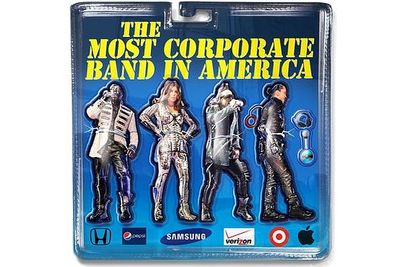I really don't like the Whack Eyed Peas. Don't now, and never did. But that's not the point of this post.
There's a piece in the Wall Street Journal about the group's marketing savvy and how they've been able to gain the sponsorship support from major corporations such as Apple, Blackberry, Samsung, Best Buy and a bunch of others. Of course, none of this would be possible without their having sold 26 million albums around the world. Clearly, mainstream territory.
Here's the thing: This may seem out of reach for a lot of black rock bands. However, what you have to give Will.i.am credit for is understanding how to work with brands. And this is something everyone can learn and do, right down to the local level.
Some things I'd suggest musicians can think about (and if you don't want to, then get someone–a manager, a lawyer, your best friend with the MBA–to help you):
- Know your lane. This encompasses a couple of things. First, can you describe what you do quickly and succinctly? At SXSW, I mentioned Sharif Iman, who described himself as "Seal meets the Foo Fighters". No descriptor like this is ever 100%. But the point is, it gets people who haven't heard his music in the zone of what he does. Secondly, who comes to your shows? Guess what: For the time being, that's your audience, whether you like it or not. You need to be clear about who that is because any partner is going to want to know this.
- Build your database. I can't stress this enough. Take every opportunity to get email addresses of people who actually give a shit about you and the music you're making. I'd say that most black rock bands don't need to talk to the whole world. They just need to find the folks that care about what they do. Imagine if you could cultivate 1,000 true fans who'd spread the word and evangelize for you the next time your went or tour or released your album. What would that be worth to you? I'd say it's significant if you can maintain a connection with the ones who really care. After all, if you can book at 10-15 city tour and pull 200 people per city, that's a good look. Promoters will definitely book you, no matter what you look like, since they'll see dollars. And it all starts with a solid database.
- Be honest about who you are in the beginning and stick to that. Both your fans and your eventual partners will appreciate the honesty. Don't take this to mean that you should be inflexible. I'm just saying be clear and don't compromise who you are just to get a check. Yes, I imagine it gets harder as the money and the partners get bigger. But by having clarity in the beginning, you'll do just fine.
He [co-manager William Derella] says the band eventually scored the sponsorship in large part by
presenting ideas such as the nightly freestyle rap, and a moment when
will.i.am works variations of the company's tag line, "Love what you
do," into a seemingly spontaneous monologue during one of the show's
closing numbers, "Where Is the Love." Such gambits allowed the Peas to
get away without putting any BlackBerry banners on the stage.
- Measure everything. All partners want metrics. That's how they gauge whether or not their investment in you has been worthwhile. Companies speak in numbers because they're concrete, so be prepared to tell them how many people came to your show; hits your Web site had; people opened that email with their logo on it; and the # of people who clicked on their logo. They'll be able to tell you how many people came through their site or their store and, for example, said your band's name to get a discount. At least, they should.
Bottom line is this: You want to build a track record of working with businesses. Start with smaller ones and work your way up. Bigger companies will look at those early partners and take comfort that you and your bandmates aren't "typical artists," i.e., difficult. Make it easy for them to say yes.
Just start laying the foundation now.
This is kinda off the cuff, so I'd be interested to know what you all think.
Additional link:

